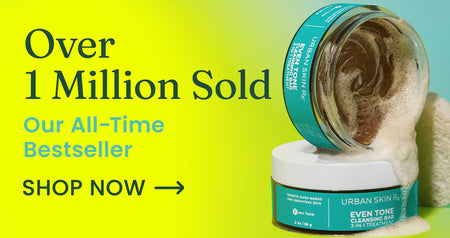How To Make Your Own Pregnancy Skincare Routine

Pregnancy comes with quite a few changes, including changing skin, hormonal fluctuations and ultimately a newborn baby. It can be hard to keep up with all of those life changes.
As your life evolves, so should your skincare routine. Pregnant women have different skincare needs and sensitivities, and some beauty products are better than others during pregnancy.
Here are our suggestions for pregnancy skincare products and a few tips on how to build your own pregnancy skincare routine. Please note, we encourage you to consult with your physician if you have any questions about the use of any of our products, or others, during pregnancy.
What Skin Changes Occur During Pregnancy?
Have you ever heard of pregnancy glow? Turns out, it’s a real thing.
Flushed and brightened skin is fairly common among pregnant women, mostly due to hormonal fluctuations that increase blood flow and oil production.
However, you may also experience some pregnancy-related skin issues. Increased oil production means you may have a higher chance of developing blemishes. Blemishes show up when your pores get clogged with bacteria and excess oil. In fact, many women experience more breakouts while pregnant.
Some women also develop hyperpigmentation due to their changing hormones. Hyperpigmentation occurs when skin gets irritated and produces extra melanin in a small area. Common forms include dark spots, freckles, melasma, red discoloration and age spots.
As your belly expands, you may start to notice stretch marks. Stretch marks are a natural part of the changes your skin goes through as your baby grows — but not everyone wants those marks to stick around.
You might also notice that your skin dries out faster. This dryness is partly due to hormonal changes but also how fast your skin is stretching. Dry skin is most common around the belly, where your skin is stretched the most.
What Skincare Products Should I Avoid?
With all of these skin changes happening at once, it makes sense that you would run to skin-brightening and blemish-removing products. However, some of these products contain ingredients that could be harmful during pregnancy. Here are a few skincare ingredients to watch out for and avoid.
Retinoids
Retinoids are just concentrated forms of vitamin A, and they’ve become increasingly popular ingredients in anti-aging products. Retinoids can smooth out fine lines, exfoliate and even minimize the appearance of blemishes.
This ingredient is quite the multitasker; however, high doses, like those in prescription products, may be linked to birth defects.
Over-the-counter products generally do not contain doses high enough to cause significant harm, but prescription Retinoids with higher concentrations may pose a risk to your growing baby.
To make sure you avoid this ingredient, here are some of the forms it comes in:
- Retinoic Acid
- Retinol
- Retinyl
- Tazarotene
- Tretinoin
Concentrated Salicylic Acid
Salicylic Acid is a chemical exfoliant that is used in products that target dry skin, redness and blemishes or pimples. This ingredient is known for being gentle and effective but can affect birth outcomes and overall pregnancy health in large doses.
This applies not just to Salicylic Acid but to other Alpha Hydroxy Acids (AHAs) and Beta Hydroxy Acids (BHAs) as well. Common AHAs include Citric Acid, Glycolic Acid, and Lactic Acid.
Not all products use oodles of acid in their formulas. The main products that can cause trouble are peels and prescription medications. Over-the-counter products that use these ingredients likely won’t cause any issues since they often use lower acid dosages.
Other ingredients in this category include:
- Azelaic Acid
- Benzoyl Peroxide
- Betaine Salicylate
- Dicarbonous Acid
- Hydroacetic Acid
- Hydroquinone
Hydroquinone is a prescription-strength ingredient that is often prescribed to brighten hyperpigmentation. Although Hydroquinone is quite effective, it can cause discomfort because it is so strong.
In fact, this potency makes Hydroquinone a no-go for pregnant women. This ingredient has not demonstrated any official birth effects, but the product absorbs heavily into the skin. Although Hydroquinone is technically considered safe, many people advise limiting use while pregnant because of how much it absorbs into the skin.
Phthalates
Phthalates (pronounced tha-layte, if you were wondering) are more common in cosmetics than in skincare products, but they are sometimes used as a binding agent in skincare. Phthalates are known endocrine disruptors and have been linked to hormonal dysfunction.
Since a healthy pregnancy requires healthy hormone function, pregnant women should stay away from Phthalates
Oxybenzone
Some chemical sunscreens make use of Oxybenzone. Oxybenzone is a known endocrine disruptor that can cause changes in lactation for women who are breastfeeding and has also shown signs of causing birth defects in animal trials.
Recent studies have shown that the chemicals used in chemical sunscreen absorb quickly into the skin and can remain in the bloodstream for up to three weeks. If your sunscreen of choice contains Oxybenzone, that’s an awfully long time for the chemical to be in contact with your baby.
If you have any doubts about whether a product will cause harm to yourself or your baby, reach out to your primary care doctor or your dermatologist.
How Can I Keep Clear-Looking Skin?
Looking at the list of chemicals to avoid, how are you supposed to target your blemishes and dark spots? We’ve put together a list of alternatives to help you keep your skin radiant and gorgeous.
If you want a product that helps brighten the appearance of dark spots, try looking for a product that contains Licorice Root Extract. This all-natural skin-brightener is gaining popularity as a gentler alternative to Hydroquinone, and it works just as well!
To reduce the appearance of blemishes, you can use low concentrations of Glycolic Acid, Azelaic Acid and Benzoyl Peroxide. These ingredients are safe in limited quantities. However, if you’re unsure, contact your physician to ensure a product can be used during pregnancy.
If Retinol is part of your wrinkle-free routine, try using Vitamin C and Vitamin E, which are topical antioxidants that help reduce the appearance of fine lines and wrinkles. Vitamin C may also help provide an extra layer of protection against the sun to ensure that you and your baby are protected outside.
Say Goodbye to Stretch Marks
Stretch marks are common in pregnancy because many areas of the skin are stretched to accommodate the growing baby. When your skin gets stretched that far, some middle layers of the skin may tear — especially if your skin is dry. These tears show up as red, purple and even silver marks.
Not everyone wants to avoid stretch marks. But if you do, we’ve got you covered.
One of the best ways to avoid stretch marks in pregnancy is to make sure your skin is ultra-hydrated. We recommend getting your hydration from two sources: water and moisturizer.
It’s important to drink plenty of water to keep your skin soft and elastic so that it can stretch with a low risk of damage. You should also invest in a hydrating lotion or oil to rub into your belly skin to help you avoid stretch marks. Vitamin C can also help reduce the appearance of stretch marks since Vitamin C can stimulate collagen production.
Stay Protected in the Sun
If you choose not to use chemical sunscreen, try looking for mineral sunscreen. Mineral sunscreens use Zinc Oxide and Titanium Dioxide to shield your skin from sun damage and are gentler for pregnant women to use.
Mineral sunscreens tend to cast a whitish tint, which may not be quite the fashion statement you’re going for. If you’d like to avoid that pale cast, look for a tinted mineral sunscreen that best fits your skin tone.
4-Step Pregnancy Routine
Your skin is changing, and so should your skincare routine! Here’s how to make a four-step skincare routine that fits your skin’s needs. If you have any questions about the use of any of our products during pregnancy, we encourage you to please consult your physician.
Step One: Cleanser
Cleanse your skin with a gentle face wash like our LacticGlow Micropolish Resurface & Brighten Cleanser. This gentle cleanser contains Lactic Acid and Hyaluronic Acid to help infuse your skin with hydration and brighten your appearance.
Step Two: Brightening Serum or Toner
Once your skin is dry, apply a brightening serum like our Super C Brightening Serum in the morning and a hydrating serum like our Reti-Glow™ Gentle Resurfacing Night Oil in the evening. These serums make use of hydrating ingredients like Vitamins C and E to gently even out your skin and brighten its appearance.
Step Three: Hydrating Moisturizer
Whether you have dry skin or oily skin, you should invest in a penetrating moisturizer to keep your skin soft and supple. We recommend our HydraBalance Brightening Moisture Infusion, which is specifically formulated to keep your skin hydrated.
Step Four: Mineral Sunscreen
Protect your skin each morning with a mineral sunscreen such as our SheerGlow™ Even Tone Daily Defense Mineral Moisturizer SPF 30. This formula is lightweight and made with hydrating ingredients to keep your skin protected and supple.
In Conclusion
Pregnancy can bring about many changes, especially in your skin — which means your skincare routine should change, too. You’ll need to start looking out for certain ingredients and looking for others. Some ingredients to avoid during pregnancy include prescription-strength Retinol, Salicylic Acid and Hydroquinone.
Generally, over-the-counter products do not contain concentrations high enough to cause harm, but if you have any questions about the use of any of our products during pregnancy, we encourage you to consult your physician.
Ultimately, your new routine should be all about keeping your skin bright and hydrated, as naturally as possible. If you need more advice on building your pregnancy routine, our Licensed Aestheticians are more than happy to schedule a virtual consultation to help get you started.
Engagement Manager



